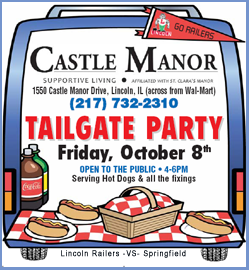|
Voters
to get Illinois Supreme Court voting guide
 Send a link to a friend
Send a link to a friend
[September 25, 2010]
SPRINGFIELD -- By the time
voters step into the polling place this November, they will likely
know plenty about the candidates for governor, senator, even state
representative and local officials. But what will they know about
the people running to remain on the Illinois Supreme Court?
|
 Three Supreme Court justices are running for retention this fall. But unlike most candidates on the ballot, chances are voters won't see a lot of campaign commercials or billboards for the three. That's why Citizen Action Illinois and the John Marshall Law School have created a voter guide for the high court. Three Supreme Court justices are running for retention this fall. But unlike most candidates on the ballot, chances are voters won't see a lot of campaign commercials or billboards for the three. That's why Citizen Action Illinois and the John Marshall Law School have created a voter guide for the high court.
There are other professional guides that rank or evaluate the Supreme Court justices, but the guide from Citizen Action looks beyond performance.
William McNary with Citizen Action said he wanted to let voters know what a justice has been doing with their time on the high court.
"For too long voters have walked into the booth and made
decisions on judicial retention based upon a few perspectives or by
special-interest ad campaigns," McNary said. "This particular report is based upon common-sense understanding of the role of judges in our system of government and how these decisions affect everyday people."
McNary and officials from the John Marshall Law School examined decisions from the high court over a
10-year period.

Walter Kendall with the law school said his group focused on cases where he believes a voter can get a sense of what a particular justice is thinking.
"We eliminated all of the criminal cases; we eliminated all of the cases where there was a majority opinion. What we were looking for was a better understanding of legitimate differences of opinion, where some of the justices voted one way and the other way,"
he said.
McNary adds that Citizen Action wanted to give voters more than just a legal or professional review of the justices.
"The (Illinois State) Bar Association generally does a good job of grading judges on values such as temperament or integrity or competence or their experience. Corporate interests generally do a good job of grading judges on how well they support their corporate agenda. We believe that consumer and family and workers' rights matter as well,"
he said.
The Illinois State Bar Association declined to comment on the Citizen Action judicial grade book.
[to top of second column] |
 The role of corporate interests in Illinois' judicial elections has been criticized in the past.
Kendall said that is why this latest judicial guide tries to focus on the rulings themselves, and not how one group or the other interprets the rulings.
"It has nothing to do with partisan politics at all," he said. "There are several opinions where the four justices we focused on voted wrong and others where they voted correctly from a consumer/working families perspective. ... To the extent that we are going to have elections, people need to know more about the candidates than whether or not they're people with integrity and some competence as lawyers and practitioners."
The
judicial guide (PDF) can be found at Citizen Action's website,
http://www.citizenaction-il.org/.
[Illinois
Statehouse News; By BENJAMIN YOUNT]


 |